Do you want to know about German Shepherd teeth problems, causes, prevention, and treatment options? You’re in the right place.
Like many dog breeds, German Shepherds can also experience various dental problems.
Caring for your German Shepherd’s teeth is crucial to their overall health and longevity.
This article provides a detailed guide on common dental issues in German Shepherds, how to prevent them, and effective treatment options.
Topics
- Common Teeth Problems in German Shepherds
- Periodontal Disease
- Tooth Fractures
- Retained Baby Teeth
- Malocclusion
- Tooth Wear (Attrition)
- Oral Tumors
- Symptoms of Dental Problems in German Shepherds
- Causes of Teeth Problems in German Shepherds
- Prevention Tips
- Regular Brushing
- Dental Chews and Toys
- Healthy Diet
- Routine Vet Checkups
- Professional Cleaning
- Treatment Options
- Dental Cleaning
- Tooth Extraction
- Root Canal Therapy
- Medications
- Surgical Intervention
- Conclusion
RELATED
- Common Mistakes to Avoid When Grooming a German Shepherd
- Degenerative Myelopathy in German Shepherds | Causes & Prevention
- Hip Dysplasia in German Shepherds | Causes & Prevention
- Common German Shepherd Health Myths Debunked
- Do German Shepherd Puppies Lose Their Teeth?
- How to Extend the Lifespan of German Shepherd
01. Common Teeth Problems in German Shepherds
Below are some of the common teeth problems in German Shepherds & other dog breeds:
01. Periodontal Disease
Periodontal disease is one of the most common dental issues in dogs. It occurs when plaque and tartar buildup in the gums and supporting structures of the teeth lead to inflammation and infection.
| Note: This condition can cause pain, tooth loss, and even systemic health issues if bacteria spread to other organs. |
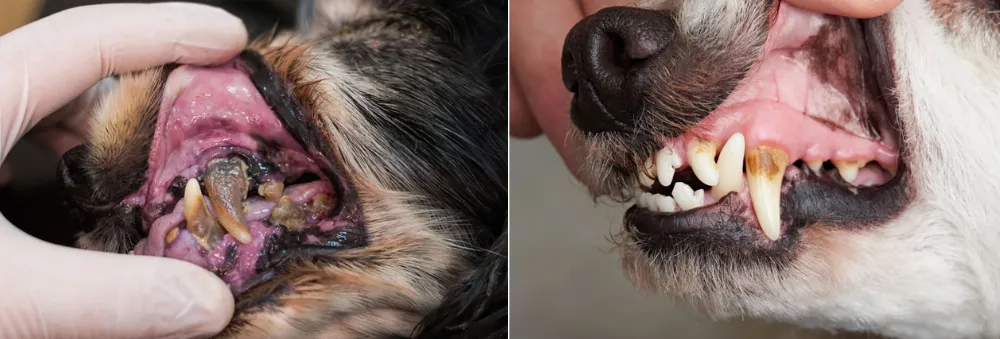
02. Tooth Fractures
German Shepherds are active and have powerful jaws, which sometimes leads to fractured teeth from chewing on hard objects like bones, toys, or sticks. Broken teeth can expose the pulp, causing pain and infection.

03. Retained Baby Teeth
In some cases, a German Shepherd puppy’s baby teeth do not fall out as the adult teeth emerge, leading to overcrowding, misalignment, and an increased risk of tartar buildup.

04. Malocclusion
Malocclusion, or misaligned teeth, can occur due to genetic factors or improper jaw development. It can cause difficulty in chewing and abnormal wear on teeth.
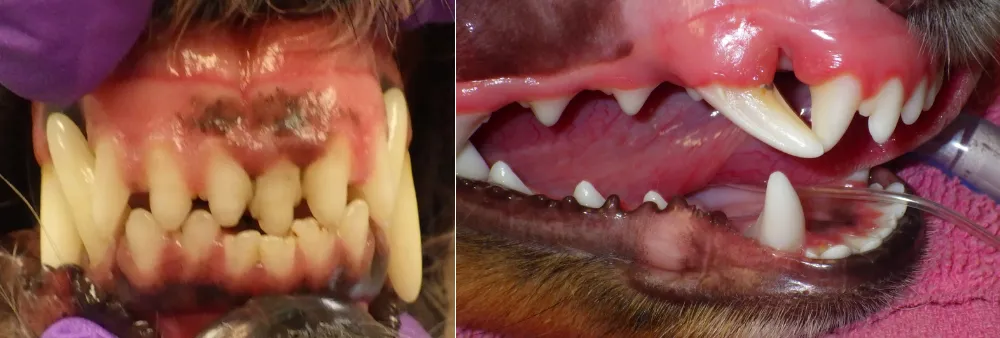
05. Tooth Wear (Attrition)
German Shepherds that obsessively chew on abrasive objects or suffer from misaligned teeth may experience tooth wear over time, leading to sensitivity and compromised tooth integrity.
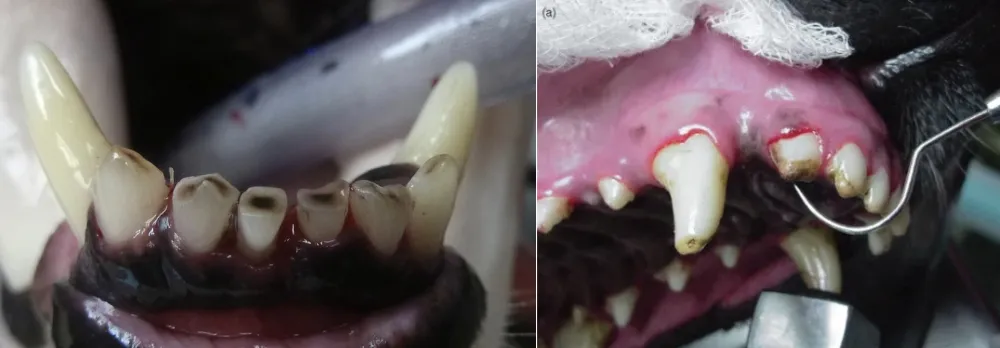
06. Oral Tumors
While less common, German Shepherds can develop oral tumors, both benign and malignant. These can interfere with eating and cause discomfort.
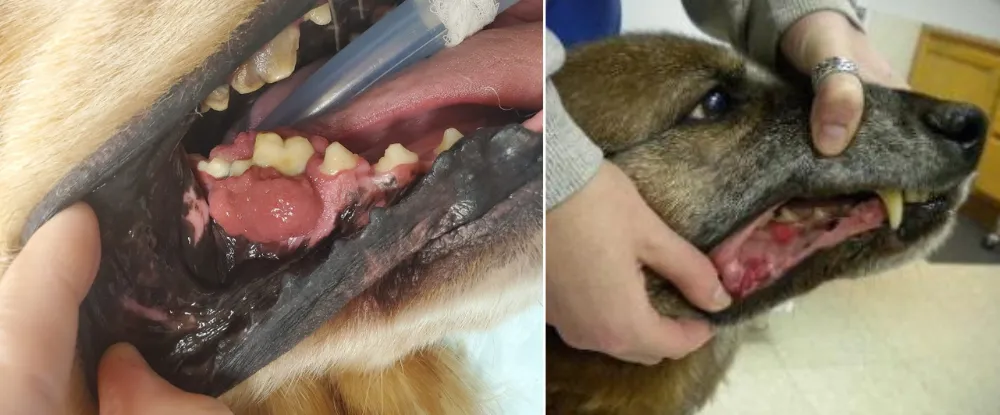
02. Symptoms of Dental Problems in German Shepherds
Below are some of the symptoms of dental problems in German Shepherds & other dog breeds:
- Bad breath (halitosis) – a foul-smelling breath in dogs
- Swollen or bleeding gums
- Difficulty eating or chewing
- Excessive drooling (hypersalivation or ptyalism) – the excessive production and release of saliva from the mouth
- Loose or missing teeth
- Yellow or brown tartar buildup
- Swelling around the mouth or jaw
- Behavioral changes such as irritability
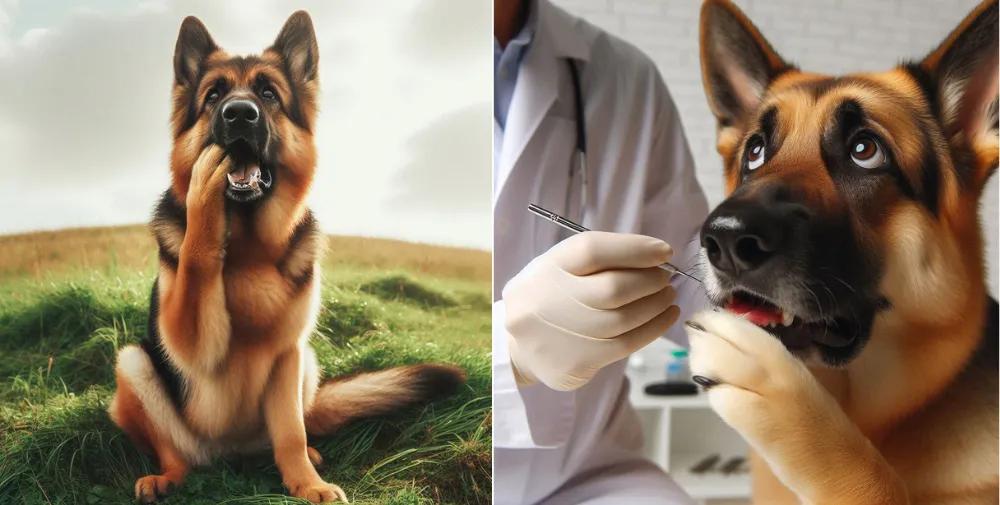
03. Causes of Teeth Problems in German Shepherds
Below are some of the causes of teeth problems in German Shepherds & other dog breeds:
- Lack of regular brushing can lead to plaque and tartar accumulation.
- A wet food or soft diet may increase the risk of plaque buildup in dogs since it lacks the abrasive texture that helps clean teeth.
- Chewing on inappropriate objects can cause tooth damage. For example, cooked or uncooked bones, antlers, hard and thick rawhides, plastic or nylon bones, cricket balls, large ice cubes, cow hoofs, and pig ears can cause teeth problems.
- Certain dental conditions, like malocclusion, may be inherited.
- Older German Shepherds are more prone to dental issues due to natural wear and tear.
| Reduce Tartar Buildup and Maintain Oral Care: Healthy dental dog foods |

RELATED
- At What Age German Shepherds Slow Down?
- German Shepherd Energy Levels by Age | Activity Needs
- Should You Shave a German Shepherd in Summer?
04. Prevention Tips
Below are some of the prevention tips for teeth problems in German Shepherds and other dog breeds:
- Brush your dog’s teeth at least 2-3 times a week using a dog-specific toothbrush and toothpaste. This helps reduce plaque buildup and prevent gum disease.
- Provide safe, vet-recommended dental chews and toys designed to reduce tartar and promote gum health.
- Incorporate high-quality, crunchy kibble or dental-specific diets that help clean teeth naturally through chewing.
- Schedule annual or biannual dental checkups to identify and address issues early.
- Have your vet perform regular professional cleanings to remove tartar and check for underlying problems.
| Boost Dental Health of Your Dog: Best Dental Chews & Treats | Dog Dental Care & Cleaning Kit |

05. Treatment Options
Below are some of the treatment options for German Shepherds and other dog breeds’ dental problems:
01. A thorough professional cleaning under anesthesia is often necessary to remove tartar and treat gum disease.
02. Severely damaged or infected teeth may need to be removed to prevent further complications.
03. For fractured or infected teeth, root canal therapy can preserve the tooth while removing the pain source.
- The root canal therapy is a procedure to save a damaged or infected tooth by removing its pulp, cleaning, and sealing it. It’s commonly done to preserve important teeth like canines or large chewing teeth.
- Costs of root canal therapy can range from $1,000 to $5,000, depending on the tooth and location.
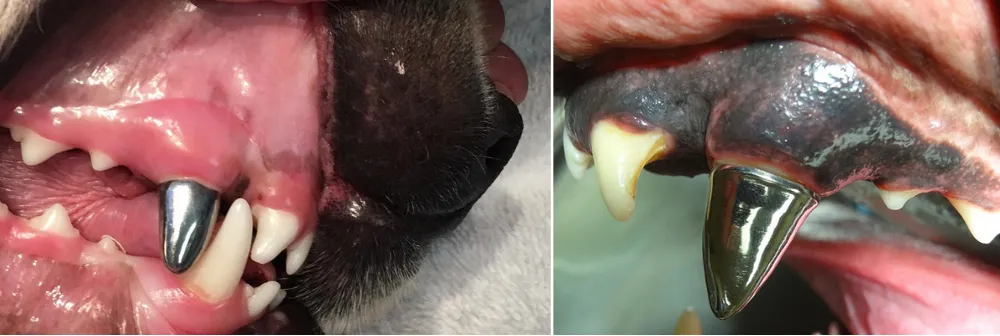
04. Antibiotics and anti-inflammatory medications are often prescribed for dogs undergoing dental treatments to manage infection and pain.
- Antibiotics such as Clindamycin, Amoxicillin/Clavulanic Acid (Clavamox), and Metronidazole help eliminate bacteria causing dental infections, such as abscesses or periodontal disease.
- Anti-inflammatory drugs such as Carprofen (Rimadyl), Meloxicam (Metacam), and Prednisone reduce swelling and discomfort, promoting faster healing and improved oral health.
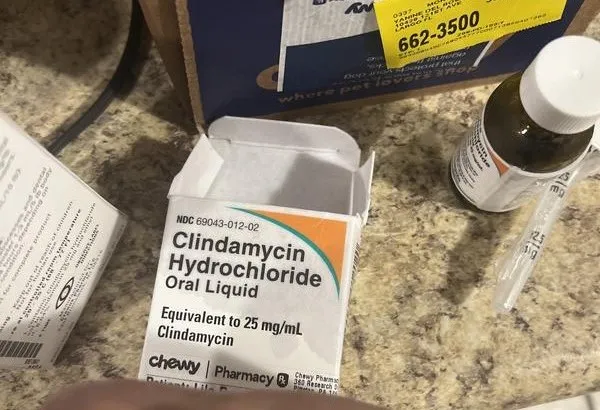
05. For oral tumors or severe gum disease, surgical treatment may be required, as listed below:
- Tumor Excision – Removal of benign or malignant oral tumors, such as epulides or squamous cell carcinoma.
- Mandibulectomy/Maxillectomy – Partial removal of the jaw to treat extensive tumors or severe bone damage.
- Gingivectomy – Surgical removal of diseased gum tissue to manage advanced periodontal disease.
- Tooth Extractions – Removal of severely affected teeth when preservation is not possible.

06. Conclusion
German Shepherds are prone to dental problems, but with proper care and timely intervention, these issues can be minimized or avoided entirely. Regular dental hygiene practices, a balanced diet, and routine veterinary care are the cornerstones of maintaining your dog’s oral health. By staying vigilant about your German Shepherd’s dental health, you can ensure a happier, healthier life for your loyal companion.
| Pro Tip: If you suspect your German Shepherd is experiencing dental issues, consult your veterinarian promptly to determine the best course of action. |
If you like this post, please share it with others. You can also share your feedback in the comments section below.
Also Read
- How to Determine the Age of German Shepherd
- What are Challenges of Training & Raising German Shepherd?
- Training German Shepherds for Families With Young Children
- What Health Products Should Every German Shepherd Owner Have?

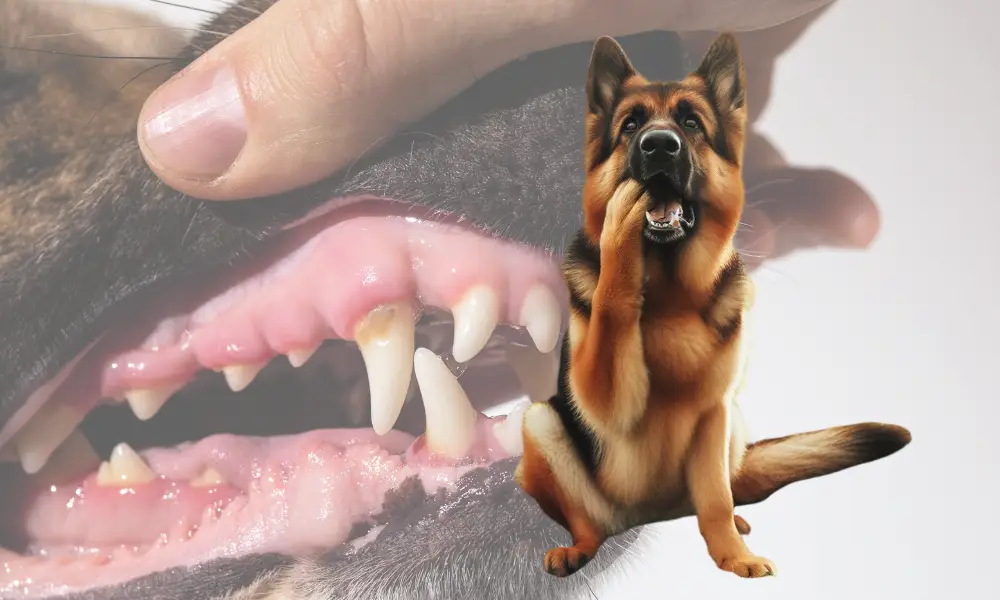


Leave a Reply